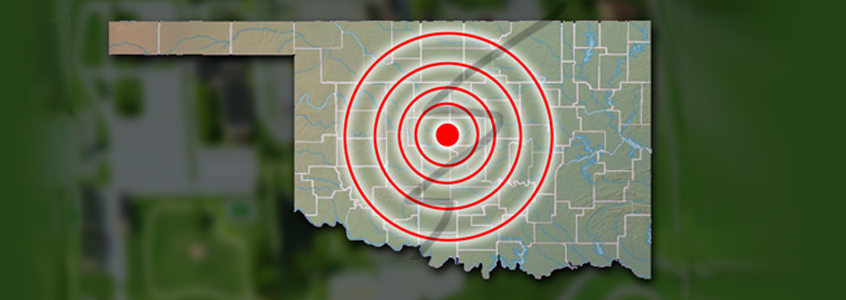Earthquake - Generally No Warning

While inside building:
- Duck and cover (see next section below) underneath desk or table.
- Be cautious of computers and other equipment. In an earthquake, items on a table or desk are likely to fall off. Computers and other equipment can start fires.
- Stay clear of windows or glassed-in areas.
- Stay clear of anything hanging on ceilings or walls that may fall and cause injuries.
- Do not leave the building during the quake as there is extreme danger exiting or entering buildings.
- If there is not a desk or table available and there is a door without windows in the area (i.e. interior classroom or closet door) take cover in the doorframe. Stand with your back to one side of the doorframe and brace your arms on the opposite side.
Duck and Cover position:
- Get on your knees with your chest to your knees.
- Put your forehead to the floor.
- Your elbows should be touching the floor.
- Clasp your hands behind your neck.
- If possible hold on to a leg of the desk/table (wrap your arm around the leg then clasp your hands behind your neck).
While outside building:
- Remain outside, preferably in a vehicle.
- If not in a vehicle, take the duck and cover position in an open area.
- Stay clear of electrical wires, poles, trees or anything that might fall.
When the earthquake has stopped, remember that there are usually aftershocks for several hours after the original quake which can be as powerful, more powerful or weaker than the original earthquake. Even a weak one can cause severe damage after a larger quake. Also keep in mind, the first earthquake may be a fore shock to a more powerful earthquake.
After earthquake:
- Evacuate buildings to an open area in safest way possible - DO NOT USE ELEVATORS
- Do not allow people to enter buildings until buildings have been inspected for hazards or structural damage (brick buildings can be very dangerous, when walking near a brick building be extremely careful)
- Be sure to check for fires, gas and water leaks, downed electrical wires, trees, and anything else that could cause injury.
More Information Can Be Found Here:
- United States Geological Survey http://earthquake.usgs.gov/earthquakes/
- Oklahoma Earthquake Information http://earthquake.usgs.gov/earthquakes/states/index.php?regionID=36
For CCERT Members:
To Do List - After An Earthquake!
- Make sure you get your shoes on, there may be considerable glass shards and other object that could injure your feet. Medical attention may not be immediately available, so this is a bad time to hurt yourself through negligence.
- Do not move anyone who is seriously injured unless other danger is imminent. Contact Security immediately to report the injury. If possible, let trained medical personnel make this judgment.
- If you join rescue work, tread warily as building foundations will be weak and there is the possibility of an aftershock.
- If you think that there may be damage to utilities then shut them off.
- Use your cell/radio to find out information about the quake, what other dangers might be lurking and what to do about them.
- Avoid tying up communication lines. Unhung phones can cause systems to shut down, so be sure to hang up all phones.
- Be judicious about leaving your present location to search for loved ones or to travel home. Moving about just after an earthquake can bring you up against unexpected hazards like broken gas mains, impassable roads and downed power lines.
